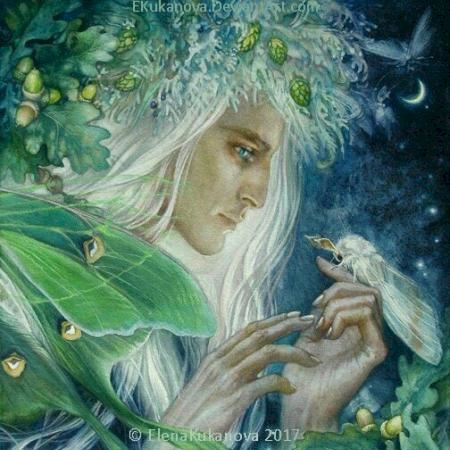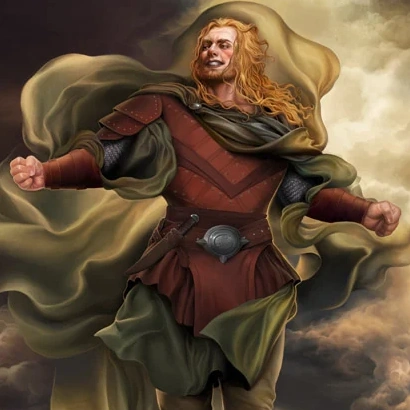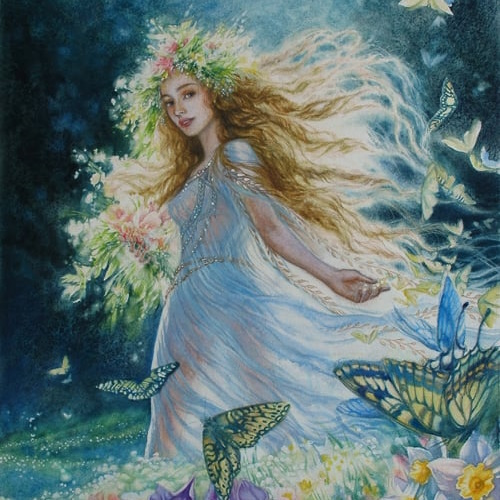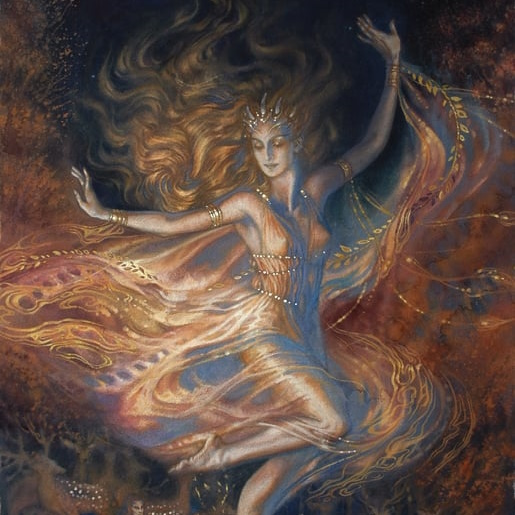About this webpage
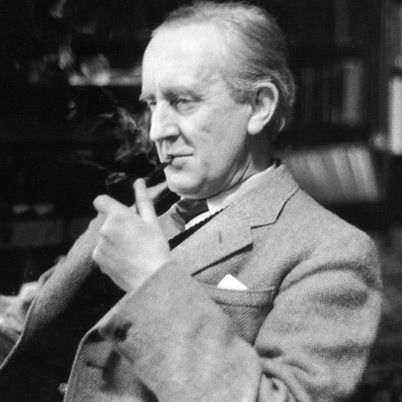
This webpage is dedicated to Tolkien's works, in particular The Silmarillion. I aim to break it down into chunks of characters, locations, and events, so that it can be easily digested. You can either learn about the Legendarium here or use it to refresh your memory if you have already read Tolkien's works; if you have not read his works, however, I would strongly recommend it, as they are some of the best fantasy stories ever! The reading order I would recommend is The Hobbit > The Lord of the Rings > The Silmarillion, then go from there. The Silmarillion itself is formatted almost as more of a history account than a typical novel, so bear in mind that it is not as easy of a read as the others.
Tolkien himself was a Philologist (sort of like half linguist half historian) who worked at the University of Oxford. He loved language and even invented his own, such as Quenya and Sindarin, and he made the writing system Tengwar. His profession and love of myths and legends lead to him creating his own world, or his "legendarium" as he called it, in which he could house his languages. It is a creative work he spent his whole life making and iterating upon, and therefore it is incredibly intricate and has a vast history.
The Silmarillion itself is a collection of several stories: Ainulindalë, the creation story; Valaquenta, an introduction to the Valar; Quenta Silmarillion, the main body of the book detailing the happenings of the first age, and the events surrounding the 3 Silmarils; Akallabêth, the rise and fall of Númenor; and finally, Of The Rings Of Power And The Third Age, which is pretty self explanatory.
I hope that, in reading this page, you can learn more about the Legendarium yourself and share my appreciation of its majesty!
Ainulindalë
Music of the Ainur
Eru Ilúvatar
"There is Eru, the One, who in Arda is called Ilúvatar..."
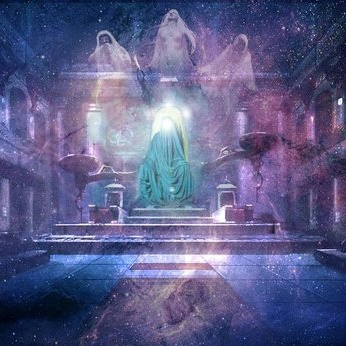
Ilúvatar is an omniscient being who existed before all others. He bears the Flame Imperishable, and this he used to create the Ainur, who serve him faithfully. Out of all the Ainur, Melkor was gifted the most power and knowledge.
While Ilúvatar delegated much of the fate of Arda to the Ainur, he himself had many designs that were known to none but him; for example, what happens to men after they die, and depart from the circles of the world.
The Ainur
"Then the voices of the Ainur, like unto harps and lutes, and pipes and trumpets, and viols and organs..."
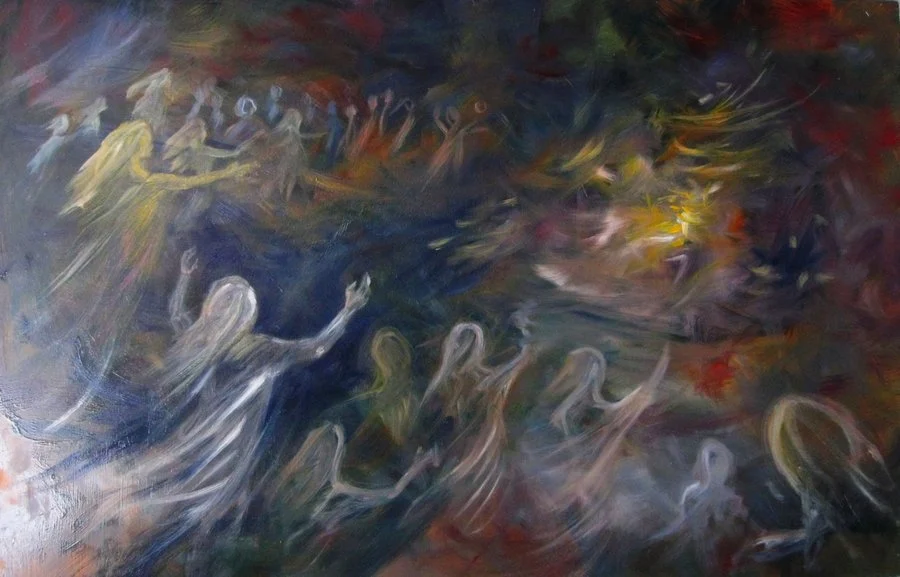
The Ainur were created by Ilúvatar. Initially they sang but individually, however, they began to work together and over time, they grew in unison. Then Ilúvatar layed before them a Great Music, and they then sang in a mighty harmonious theme, a theme that would dictate the fate of Arda. Each ainu interwove their own thoughts and ideas into the music.
It is said that the music they made was so great that never since has music like it been made, though greater music still may arise in the end days.
Melkor
"Then the discord of Melkor spread ever wider..."
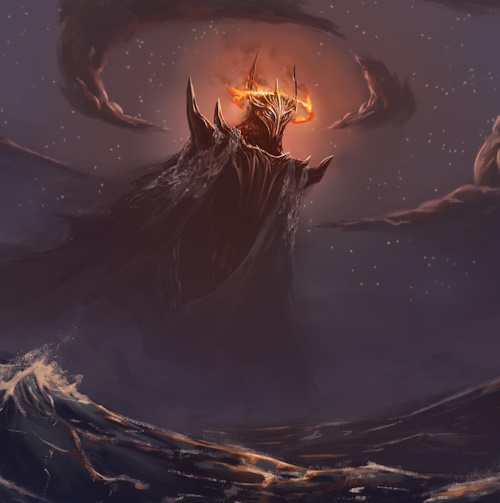
Melkor, being granted higher power by Ilúvatar, searched the void apart from the others for the Flame Imperishable; however, as Ilúvatar kept it, Melkor could not find it. Having spent time alone, he desired then to weave discordant notes into the music for his own personal benefit.
His discord spread throughout several other Ainur who faltered and eventually grew attuned to his own discordant notes, creating a disharmony within the music. Fortunately, the discord of Melkor has been recreated in real life, you can view it here.
Arda
And as they looked and wondered this World began to unfold its history, and it seemed to them that it lived and grew.

Eventually, Ilúvatar emitted a deep and piercing note, ceasing the music. Then the Ainur were given sight (where before there was only hearing) and they saw an image of Arda, born from their music. They saw each of their own thoughts and creations come to fruition, as the history of the world was played out in front of them. There were, however, some aspects that were hidden and known only to Ilúvatar, so that only he knew truly of the fate of Arda. However, this image of the world was removed as it came to the fourth age.
Now enshrouded in darkness, the Ainur were unsettled; but Ilúvatar set forth the Flame Imperishable as the heart of the world, and thus Ëa (essentially the universe), and within it Arda, the Earth, came into being. Many of the Ainur, among them some of the most noble, chose to descend to Ëa, and those that did had their power contained to the world; these Ainur are called the Valar. However, the Valar saw that Ëa was not as they had seen in the prior vision, rather it was unmoulded and unformed; the Valar, then, got to work to shaping it to their will. Melkor first took Arda and declared it his kingdom, but the other Valar would have it as their own, because as they had foreseen, Arda is the birthplace of the Children of Ilúvatar (Elves and Men), and so they wanted to prepare it rightly for their arrival.
Wars between Melkor and the Valar waged on for ages uncounted, and where the Valar created, Melkor destroyed. Eventually, however, though not exactly as the Valar had purposed, Arda was finally made fit for habitation.
Valaquenta
Account of the Valar
The Valar
The Great among these spirits the Elves name the Valar, the Powers of Arda, and Men have often called them gods.
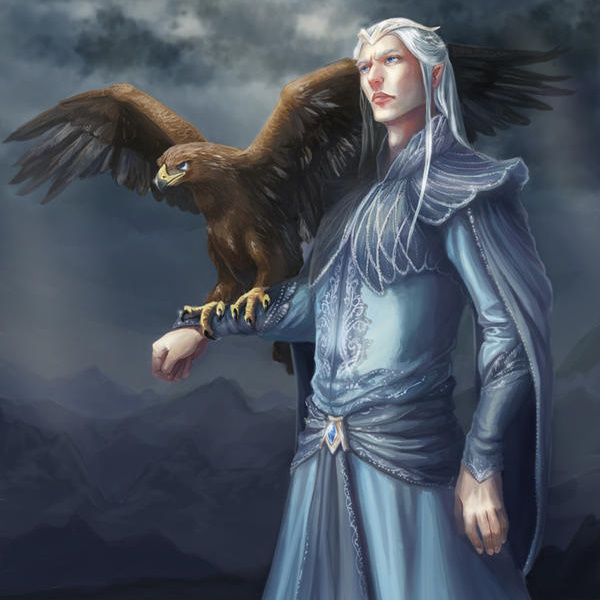
Valaquenta tells of the Valar, the most powerful of the spirits that Ilúvatar sent to Ëa. The less powerful of the spirits were the Maiar, which I will not detail here as they are rarely of importance in the story aside from one (Melian). The Valar are essentially gods of Ëa, with might far surpassing any other living beings there. The most powerful Valar are Melkor, Manwë, Ulmo, and Aulë, and they play the biggest role of all the Valar. There are 7 Valar and 7 Valier (essentially female Valar, though they are usually just called Valar also). Note that Melkor is not counted among the Valar.
The Valar did not necessarily have a physical form, though they frequently chose to take form of the Children of Ilúvatar, that is Men or Elves, as they had a deep love for them. They could, however, dispell this form any time. Each of the Valar also corresponded to an attribute which they contributed to the music when they were ainur, for example Manwë favours air and wind.
It would come to be that the Valar dwelt in western continent of Aman, in the city of Valimar. This was out of reach of all Men and all Elves who did not come to the continent when originally offered, and eventually, at the end of the second age, when Númenor fell, the world was made spherical and Aman was removed from the world, and one who sailed west from Middle-Earth would wrap around and come upon the eastern coast of the east continent. Only those who know the Straight Road could arrive at the sacred continent of Aman.
While there are a lot of Valar, only a handful of them are of great significance, I have marked the important ones with an asterisk.
Manwë*
"his delight is in the winds..."
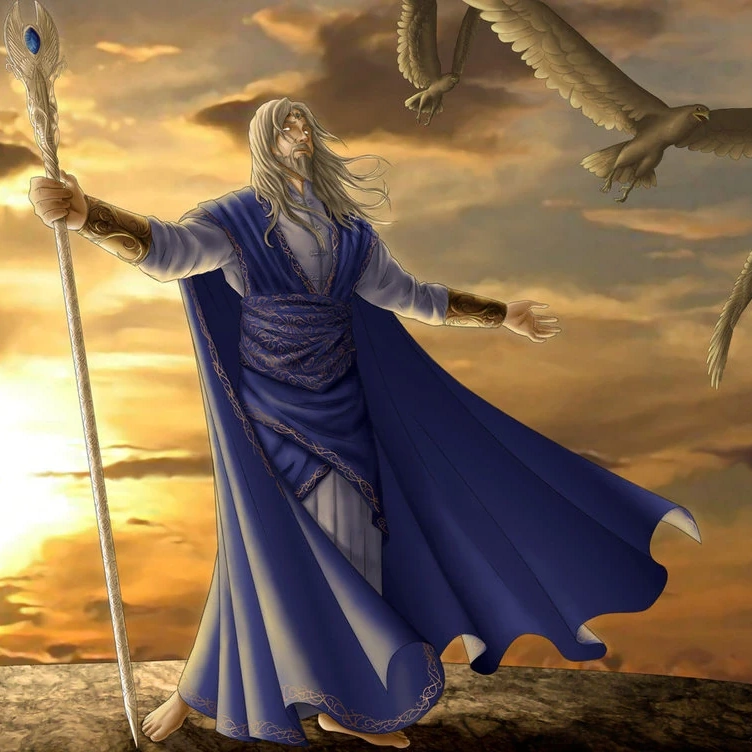
Manwë is the most powerful of all the Valar (and slightly less powerful than Melkor). His domain is the air, wind, and clouds, and he is the head of all the Valar - basically like Zeus. Ilúvatar envisioned him as being Melkor's brother.
He dwells on the mountain of Taniquetil with his spouse Varda, and it is said that with her at his side, he can see all that happens in Arda.
Ulmo*
"fountains and springs are in his government..."
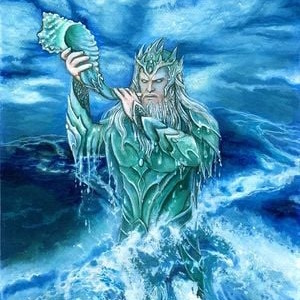
Ulmo is the Lord of Waters. He is the second most powerful Valar, and he spends most of his time alone. He was closest to Manwë, however after the creation of Arda he grew apart from the Valar and spent most of his time without form, roaming the oceans.
Occasionally, he will play music on his horns made of white shell, and those who hear it long for the sea ever after.
Aulë*
"His are the gems that lie deep in the Earth..."
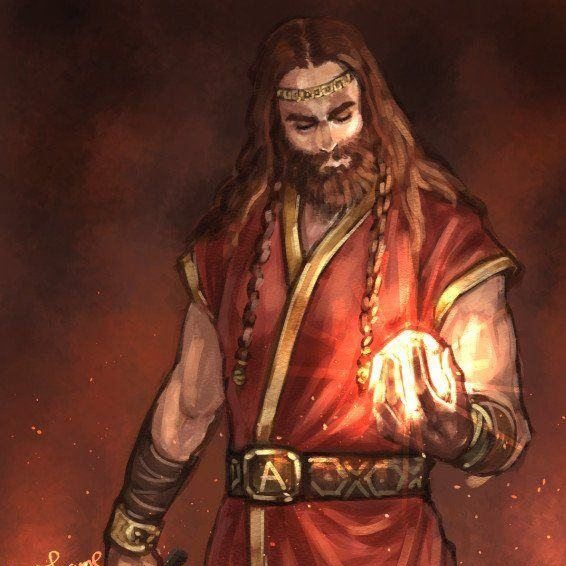
Aulë is the third most powerful Valar, and his domain is material and substance; rock, iron, gold, gems. He loved all crafts and he was favoured most by the Noldor (a group of Elves).
Melkor especially hated Aulë as he was jelous of him, and so Melkor was constantly trying to mar and destroy Aulë's creations.
Oromë
"Oromë is a mighty lord."
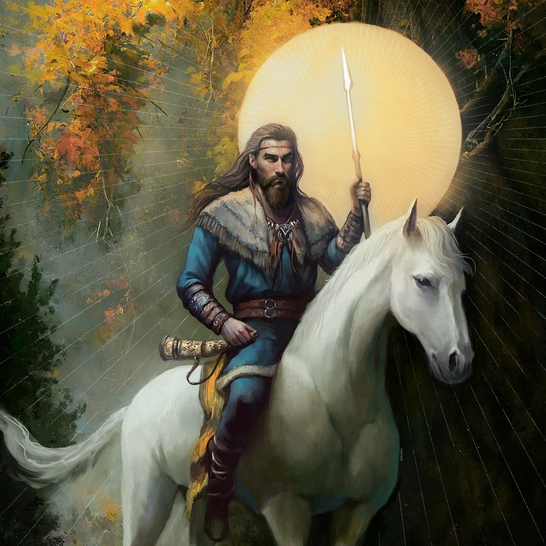
Oromë has a degree of physical strength, less so than Tulkas, but he has an anger greater than any other Valar. He is lord-like and he carries with him a horn and he rides a white horse.
Oromë loved the land of Middle-Earth most of all the Valar, and he was most sad to depart it. There he hunts for beasts and monsters.
Námo (Mandos)*
"He forgets nothing."
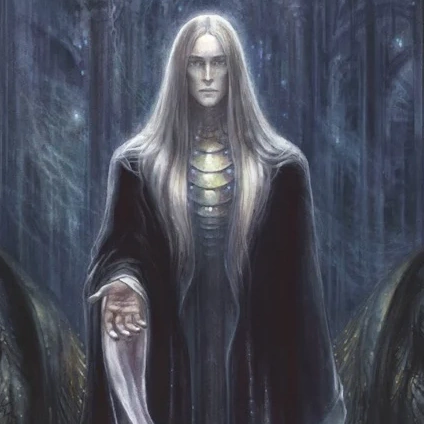
Námo is more commonly known as Mandos, a name he recieves from the land he dwells in, sharing the name Mandos (he will be referred to as Mandos henceforth). He dwells in the Houses of the Dead, keeping them in check, and he has the greatest knowledge of the events both past and future of all beings.
At the will of Manwë he gives out prophecies or "Dooms" and judgements.
Varda*
"Lady of the Stars..."
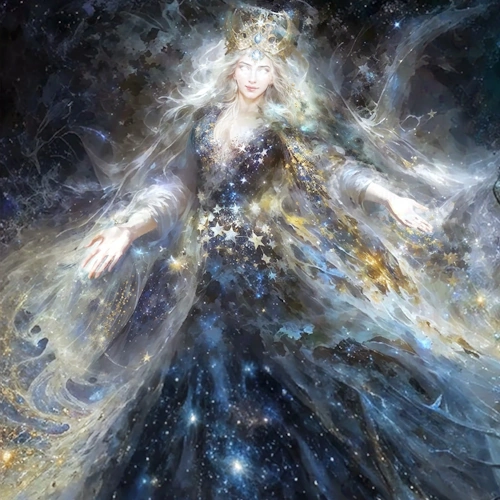
Varda is the wife of Manwë, and her domain is the stars. She is praised most of all by the Elves, as they were born under the Stars, and they name her Elbereth. She rarely strays from Manwë's side, and next to him it is said she could hear more clearly than all other ears.
Yavanna*
"Giver of Fruits..."
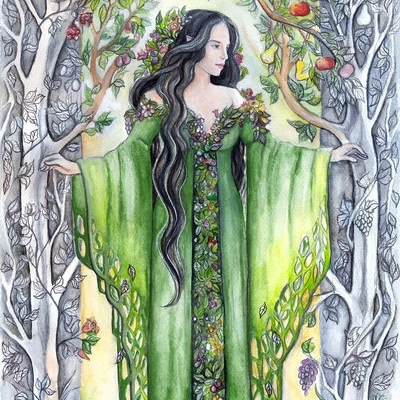
Yavanna is the wife of Aulë, and she is master of all plants and nature.
Nienna
"She is acquainted with grief..."
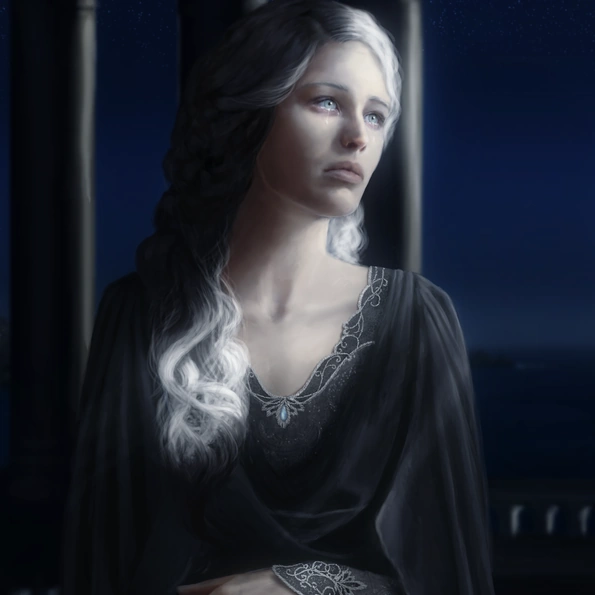
Nienna is in a constant state of grief for the evils that Melkor has inflicted upon Arda. When she was Ainur, her themes of mourning woven into the music caused sadness in the world.
Estë
"rest is her gift."
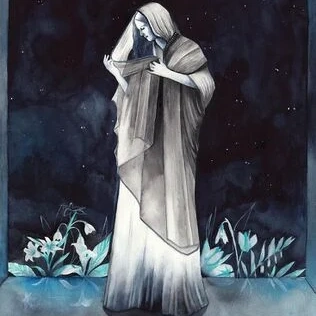
Estë is the wife of Lórien, and she heals pain and weariness in their gardens. At day she sleeps upon an island in the lake Lórellin. At the gardens of Lórien and Estë, all in Valinor find healing and refreshment.
Vairë
"Vairë the Weaver"
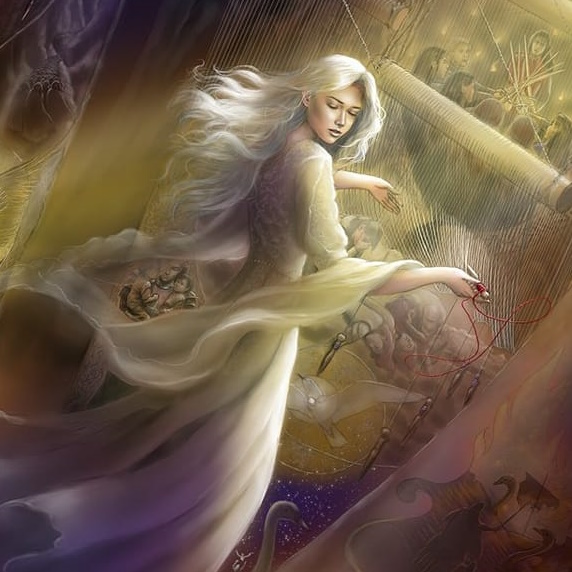
Vairë is the wife of Mandos. She weaves all of history into her storied webs, which she decorates the Halls of Mandos with.
Quenta Silmarillion
The History of the Silmarils
Of the beginning of days
"...and from each of his countless flowers, a dew of silver light was ever falling."
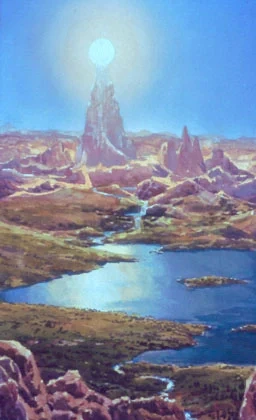
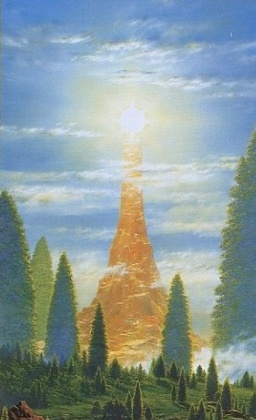
There was a time in the creation of Arda when Melkor had the upper hand. He committed some spirits to his service, and the Maiar who chose to follow him would be known as the Balrogs, the demons of terror. However, during this time, Tulkas descended as the last of the Valar to Eä, and Melkor disappeared into the shadow for a long time.
During this period of peace, the Valar worked tirelessly on the creation of Arda. They created two lamps at the edge of the world; at the north, Illuin (see right image), and at the south, Ormal (see left image). Yavanna then set down her seeds, and grass and moss and trees were set forth into the world. After their hard work, Manwë hosted a feast, on the island of Almaren, in the Great Lake, in the centre of Middle-Earth. However, Melkor used this opportunity to return, and set down a fortress, Utumno, in the base of a mountain. He declared war upon the Valar and struck first, destroying the two lamps and spilling fire over Arda. The nature there withered, and the Valar then fled to Aman, the western continent.
Upon Aman, the Valar settled and created the blessed city of Valinor, and Manwë settled upon the peak of Taniquetil, the tallest mountain. Then, just outside the west gate, Yavanna created the Two Trees of Valinor, Telperion and Laurelin, and together they gave light to all Aman. Under the light of the trees, that realm was blessed for a long, long time.
Of Elves
"The Quendi shall be the fairest of all earthly creatures..."
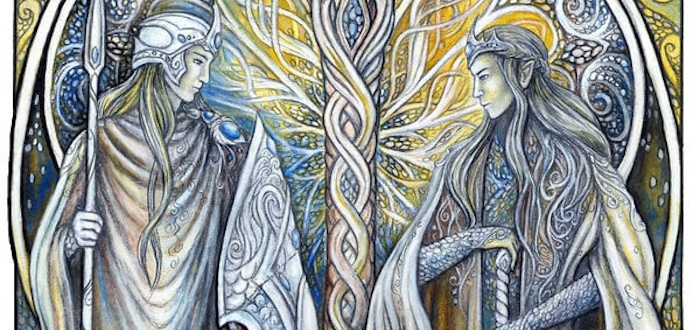
The Quendi, or the Elves, are the first of the Children of Ilúvatar. They were born under the stars in Cuiviénen, Middle-Earth.
The Elves are broadly of 4 categories: The Vanyar, the Noldor, the Teleri, and the Sindar. The Vanyar are closest to Manwë, and are the highest of all the elves. The Noldor are closest to Aulë, and are most prominent in The Silmarillion. The Teleri came last to Aman and dwelt in the city of Alqualondë. The Sindar are part of the Teleri that did not come to Aman, dwelling in Beleriand, Middle-Earth, instead. There are also the Orcs that are Elves twisted and tortured by Melkor.
When the Elves die, their soul passes to the Halls of Mandos, where eventually they are reborn. So they are effectively immortal.
Of Men
"But to the Atani I will give a new gift."

The Atani, or Men, are the second of the Children of Ilúvatar, being born in Hildórien under the first rising of the Sun.
They were given less guidance by the Valar than the Elves, and many of them initially fell to Melkor. Some, mainly the House of Hador and the House of Bëor, escaped to Beleriand, where they met the Noldor, and played part in the war against Melkor.
Men, unlike Elves, are not bound by the fates of the Music of the Ainur. Therefore, eventually the Age of Men will come to pass, where Men are the dominant species (around the Fourth Age). Men are also given the "Gift of Men", which is that when they die, their souls pass first the Halls of Mandos, and then out of the circles of the world, and none but Ilúvatar know where they go.
If you are wondering, Hobbits are a sub-species of Men. They play no significant role in history until the end of the Third Age.
Of Dwarves
"Aulë took up a great hammer to smite the Dwarves; and he wept."
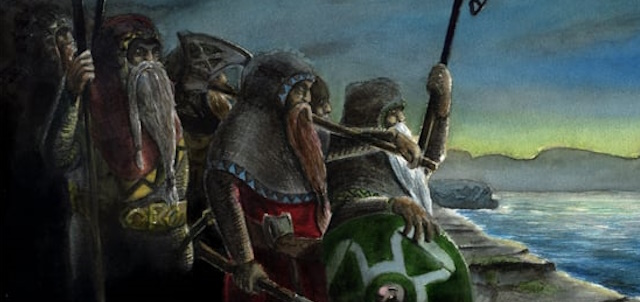
The Dwarves came to be because Aulë was impatient for the coming of the Elves, and wanted a race to share his creations and knowledge with. He made the seven Dwarves in secret, but Ilúvatar knew and he scolded Aulë for being impatient. However, as Aulë was about to destroy his creation, Ilúvatar gave the Dwarves life and told Aulë that they could be, so long as they did not come before his own children. Therefore they were kept underground until that time came.
Dwarves were made to be hardy and survive the harsh environment that Melkor had set upon Middle-Earth. It is unknown what happens to them when they die; the Elves believe they return to the Earth, whereas the Dwarves believe their souls rest in the Halls of Mandos, ready to aid Aulë in remaking Arda after the battle at the end of days.
Of Ents
"The thought of Yavanna will awake also..."
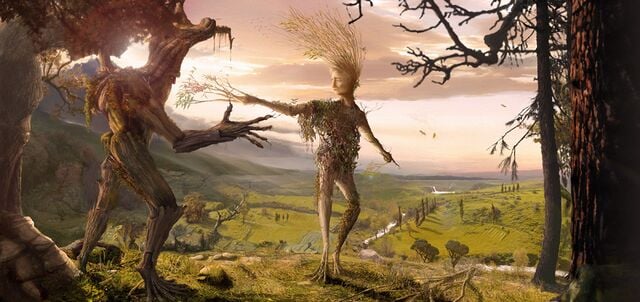
Ents came into being because Yavanna saw that Ilúvatar was willing to grant life to other beings, and she wanted a race of her own to protect her otherwise easily felled trees.
She asked Manwë for an audience with Ilúvatar, in which he asked for the Ents to be made, and he replied saying essentially that it was already told in the Music of the Ainur that the Ents would come into being anyway.
Cuiviénen and Melkor's captivity
"Shall they call Melkor lord while Manwë sits upon Taniquetil? And Tulkas cried: Nay! Let us make war swiftly!"

The Elves would be born, eventually, in Cuiviénen, under the twilight and the stars. The time of their arrival is just after Varda put forth the Sickle of the Valar, a constellation, which signified war against Melkor. In the first few years, sometimes Elves that went alone or in small groups were taken and placed under Melkor's captivity, and these would eventually become orcs.
Oromë would chance upon the Elves while hunting in Middle-Earth, and after a brief introduction, he rode back to Valinor to inform the other Valar. After holding a counsel, it was decided that they would wage war upon Melkor and take the Elves to dwell in Aman. The Valar, then, waged war upon Melkor, and the Elves saw raging fires in the distance. Utumno was destroyed and Melkor chained and taken captive; though that fortress delved deep into the Earth, and not all evil was rooted out. Sauron in particular, Melkor's chief servant, was nowhere to be found. The Valar decided that Melkor would be imprisoned for 3 full ages before any reconsiderations would take place.
Because the only experience the Elves had of the Valar was of them waging war, the Valar thought Oromë would be the best fit to lead them to Valinor, as they have met already. So, he went to the Elves and appointed 3 ambassadors to represent their groups: Ingwë represented the Vanyar, Finwë represented the Noldor, and Elwë represented the Teleri. Together, these groups went to Aman, and those who made the journey successfully were known as the Eldar. Those left behind were known as the Moriquendi. The Teleri, however, got caught up in the Misty Mountains, and there, Lenwë and a small host of the Teleri forsook the march and left; they were known as the Nandor.
Thingol
"he heard the voice of Melian, and it filled all his heart with wonder and desire."
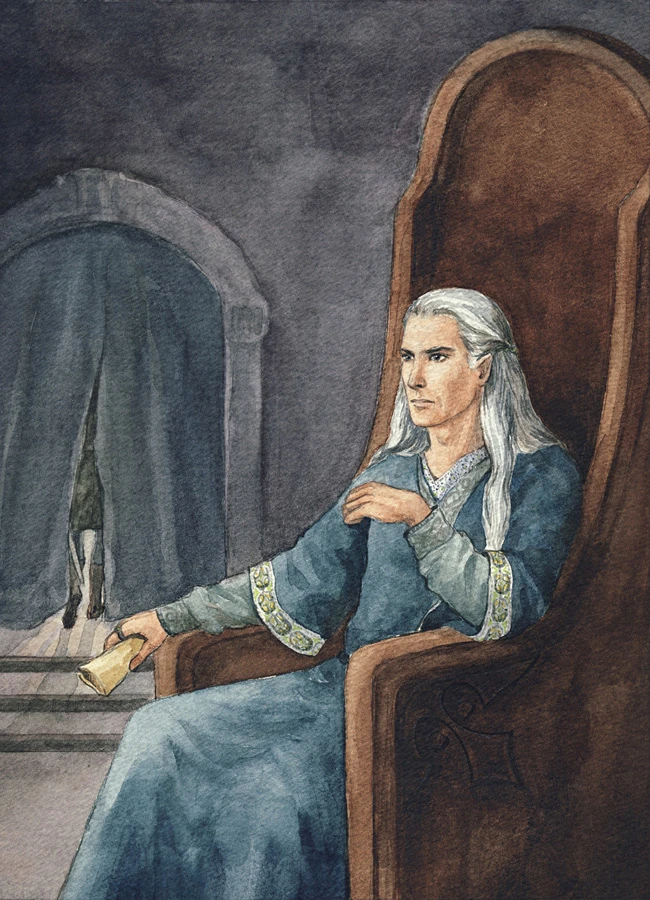
Elwë eventually crossed to Beleriand, the absolute west of Middle-Earth, ready to cross the sea to Valinor. However, during a visit to Finwë, he came upon Melian in a moonlit clearing, and was entranced by her beauty. He would then come to be known as Elu Thingol, the king of the Sindar, with Melian as his queen.
Thingol's lands were Doriath, and he resided in Menegroth of the Thousand Caves.
Melian
"the bells of Valmar were silent and the fountains ceased to flow, when at the mingling of the lights Melian sang in Lórien."
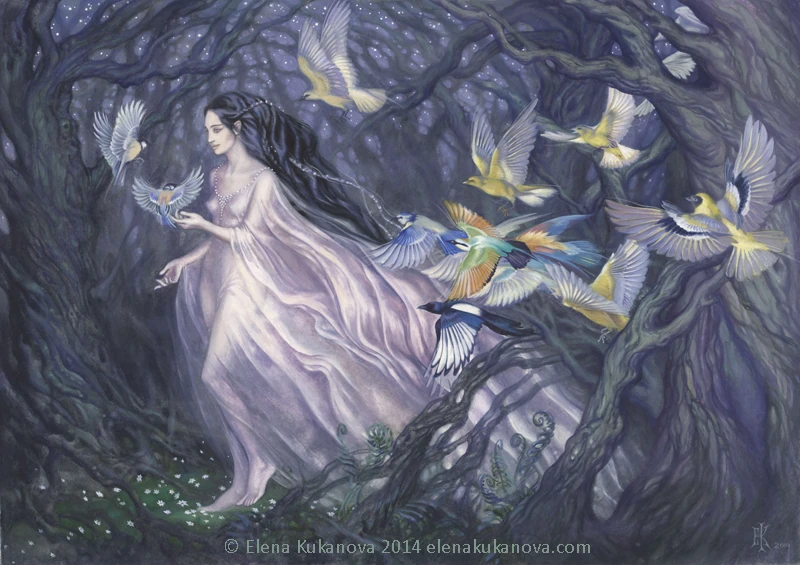
Melian was a Maia, who originally lived in the gardens of Lórien. She was the most beautiful and wise of all the people in Lórien, and wherever she went, nightingales would follow alongside her.
She would come to Middle-Earth and place an enchantment upon Elwë, and thus she was made his queen. She gave Thingol much power, and eventually she would create the Girdle of Melian around Doriath, allowing none in or out without her permission.
The Voyage of the Eldar
"Therefore Ulmo uprooted an island... and with the aid of his servants moved it, as it were a mighty ship."

As the Noldor and the Vanyar came to Beleriand, ready to cross the sea, Ulmo raised a vast island out of the sea and with the aid of Ossë and Uinen, used it to move the Noldor and the Vanyar to Valinor. The Vanyar and the Noldor built and resided in the city of Tirion, but the Vanyar would ultimately leave that place and reside instead at the base of Taniquetil, as they held Manwë clsoe to their hearts.
The Teleri, however, lost Elwë their leader, and some split off in search of him; these are what would become the Sindar. However, the rest took up Olwë, Elwë's brother, as their new leader, and then came to the shores of Beleriand. There, Ossë taught them of the sea, and already loving water, they thereafter longed for the ocean. They wanted to come to Valinor too, but Ossë wanted their company, and he persuaded some to remain on the western shores of Middle-Earth, and of these people Círdan was their leader. The rest, following Olwë, embarked upon the isle and were led to Valinor; however, they asked to be rooted amidst the sea, rather than come to the land of Aman, and Ulmo obliged. That island was then called Tol Eressëa, and the Teleri lived there long. However, they eventually longed to see the light of the trees and their old friends, and so founded the city of Alqualondë.
Tirion

Tirion was the city in which the Noldor, and initially the Vanyar, dwelt, though the Vanyar would leave eventually. The city was built upon the hill of T%uacutena, on the west coast of Valinor, and it looked towards Middle-Earth. The light of the Trees spills out into the city, and beyond it to Tol Eressëa. The topmost tower of the city contains a sort of lighthouse, where a narrow silver beam shines out onto the ocean.
It is here that the Noldor discovered gems when digging in the Earth, and so they became rich in jewels, but they did not hoard it, instead sharing it with their neighbours in Alqualondë.
